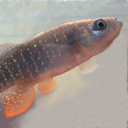Assembly
The Fundulus_heteroclitus-3.0.2 assembly was submitted by The Genome Institute at Washington University School of Medicine on January 2015. The assembly is on scaffold level, consisting of 120,723 contigs assembled into 10,180 scaffolds. The N50 size is the length such that 50% of the assembled genome lies in blocks of the N50 size or longer. The N50 length for the contigs is 16,688 while the scaffold N50 is 1,252,252.
Gene annotation
The mummichog (Fundulus heteroclitus) is a small killifish found along the Atlantic coast of the United States and Canada. Also known as Atlantic killifish, mummies, gudgeons, and mud minnows, these fish inhabit brackish and coastal waters including estuaries and salt marshes. The species is noted for its hardiness and ability to tolerate highly variable salinity, temperature fluctuations from 6 to 35 °C (43 to 95 °F), very low oxygen levels (down to 1 mg/L), and heavily polluted ecosystems. As a result, the mummichog is a popular research subject in embryological, physiological, and toxicological studies. It is also the first fish ever sent to space, aboard Skylab in 1973.
The gene annotation process was carried out using a combination of protein-to-genome alignments, annotation mapping from a suitable reference species and RNA-seq alignments (where RNA-seq data with appropriate meta data were publicly available). For each candidate gene region, a selection process was applied to choose the most appropriate set of transcripts based on evolutionary distance, experimental evidence for the source data and quality of the alignments. Small ncRNAs were obtained using a combination of BLAST and Infernal/RNAfold. Pseudogenes were calculated by looking at genes with a large percentage of non-biological introns (introns of <10bp), where the gene was covered in repeats, or where the gene was single exon and evidence of a functional multi-exon paralog was found elsewhere in the genome. lincRNAs were generated via RNA-seq data where no evidence of protein homology or protein domains could be found in the transcript.
In accordance with the Fort Lauderdale Agreement, please check the publication status of the genome/assembly before publishing any genome-wide analyses using these data.
More information
General information about this species can be found in Wikipedia.
Statistics
Summary
| Assembly | Fundulus_heteroclitus-3.0.2, INSDC Assembly GCA_000826765.1, Jan 2015 |
| Base Pairs | 1,021,898,560 |
| Golden Path Length | 1,021,898,560 |
| Annotation provider | Ensembl |
| Annotation method | Full genebuild |
| Genebuild started | May 2018 |
| Genebuild released | Jul 2018 |
| Genebuild last updated/patched | Jul 2018 |
| Database version | 111.302 |
Gene counts
| Coding genes | 23,069 |
| Non coding genes | 372 |
| Small non coding genes | 355 |
| Long non coding genes | 4 |
| Misc non coding genes | 13 |
| Pseudogenes | 28 |
| Gene transcripts | 35,597 |
Other
| Genscan gene predictions | 56,138 |
